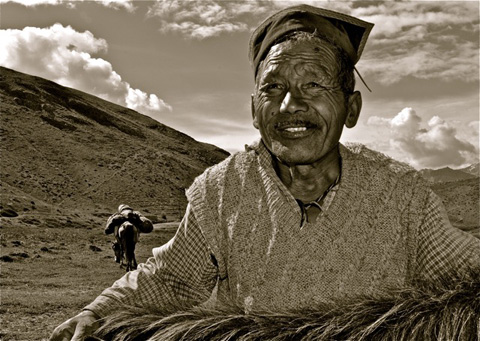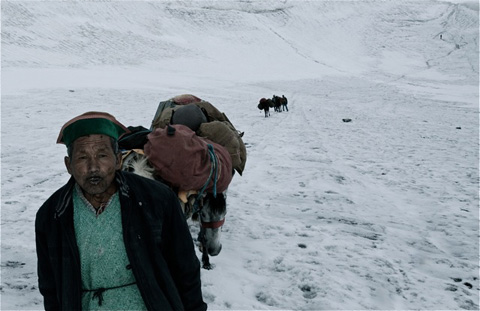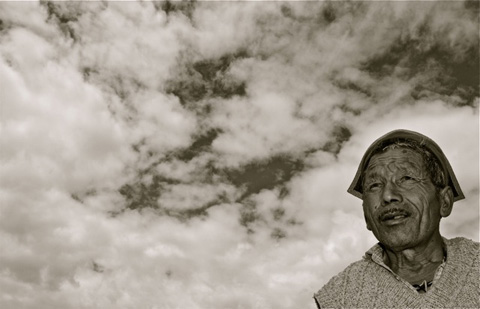Across the Himalayas
Explorer Jeff Fuchs interviews a mountain trader and guide at 4800 metres

Sadanand Negi’s face is lined and furrowed by a life time in the elements. His hands are thick, calloused tools. His body is short but powerful, perpetually ready for action.
Negi is 65, originally from Kinnaur Valley of Himachal Pradesh, and began working in the mountains when he was 13 years old. He is of a caste known for being muleteers and traders, and has been a Himalayan horseman, trader and guide for 52 years. He is a true iron-man, and an icon of the mountains.
This interview took place at 4800 metres in Ladakh, near the high-altitude lake of Tso Moriri, while I was travelling on the Route of Wind and Wool. Negi accompanied me as I made my way along the ancient trade route, collecting stories and recording the dialects of the people who lived and worked there. As a horseman and guide, Negi was a vital member of the expedition.
He was also one of the voices I’d come to hear. In a tent one afternoon, while we sipped tea, I sat beside him and asked my questions. Gesticulating with those huge, scarred hands, he spoke to me about the focus of his long life – the mountains.

Why are mountains important?
Because so much comes from them and begins in them. Water flows from them, the winds are born in them and they protect us. We here in the mountains see them as something good and something powerful. They can make you suffer but they can make you strong. Once you are “touched” by them, you belong to them.
What was the most important trade item in the mountains, in your time?
Luxuries were not important. What was important was what was needed. Salt, grain, horses, leather – these things were always important. Wool of all kinds was important as well. There was always a way to access these products … through the mountains.
What were the greatest dangers for the caravans?
Always the great worries involved men. War, bandits, fighting, treating the mountains badly, pollution – all of this was because of men and their actions. Wolves, yes, but they were smarter than men and only took what they needed at night and then disappeared. The weather too could wipe us out and make people disappear. White wind would come from the sky and make the world look the same. Horses, mules, sheep and men would disappear.
How have the mountains changed in your lifetime?
Many mountains now are black. When I was young they were covered in white. The white peaks are only a memory now. I don’t think they are so healthy anymore. They have changed because we [men] are changing. We don’t care about our mountains anymore, and they know it.
What are the mountains to you?
They are my home. I cannot think of a world that isn’t covered in mountains. When they get sick we’ll all be in trouble.
What do people who don’t live in the mountains need to know about them, the lives within them, and their history?
Each mountain has a personality. Each valley has a personality and a way of behaving. All things are attached [connected] here and nothing happens without another thing happening. We are closer to the sky so we are smarter. If you are not living in the mountains and suffering them, loving them and feeling them, then you do not know them.
Why did you work in the mountains for so many years?
I don’t want to be at home, and when I am at home my family tells me that I must rest. I don’t want to rest. I cannot leave these mountains and I cannot leave the wind. I sit at home and I don’t know what I’m supposed to do.
Are there any “rules of the road” that muleteers and traders needed to know?
Once you begin a journey, you must know when to stop and when to continue even if it gives pain. Mules and horses are more important than men, and if they are happy then you are happy. Mules and horses will always stray if you are not strong with them. They have old memories that will remember where the best grazing is and they can disappear at night to find a better restaurant. This is why it is important to camp where there is enough food for them. Otherwise you will wake one morning and the horses will be a day’s travel away. Then you will hate the horses, and hate yourself.
Another thing is to only bring what you need – and if you need too much then this isn’t the right work for you.
Is there anything you miss about the old days of trade, when you were a younger man?
I miss being younger. I didn’t feel my bones so much back then. Now my knees scream at me when I wake up. My bones hurt when I am still for too long. We also talked more.
•
Text and photography by Jeff Fuchs; editing by Katrina Hamlin
Jeff Fuchs is an award-winning explorer and writer based in Yunnan, China. He is an ambassador for The North Face and author of the ebook The Ancient Tea Horse Road
Katrina Hamlin is a writer based in Hong Kong, which she is also an editorial assistant at Reuters Breakingviews


















